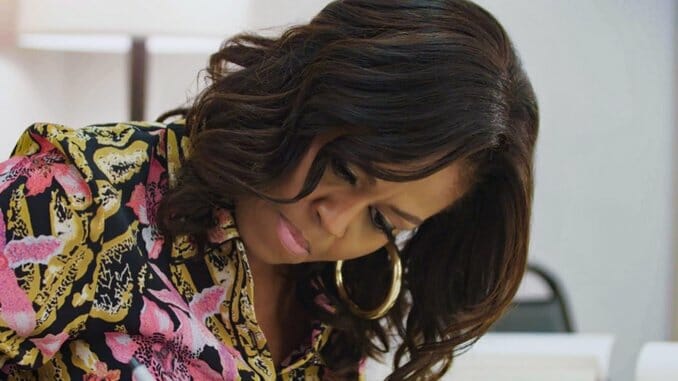There’s Black Girl Magic in Becoming, But It’s Not Necessarily Michelle Obama’s

There seem to be two goals of Netflix’s new Michelle Obama documentary—first, to humanize (or normalize) the former First Lady of the United States as she embarks on a countrywide book tour (for her bestseller of the same name), and second, to reinforce the idea that Michelle Obama is a woman necessarily and eternally concerned with race and racism in America, particularly for Black women. The first goal is achieved, almost as much as it can be, and the personal stories and appearance of family members like her mother and brother are the strongest part of the Becoming experience. The second goal is a little more complicated, largely due to the fact that Michelle Obama occupies a strange space as a figure who is neither a politician, nor an activist—but who often presents like one or the other.
Nadia Hallgren’s film is an attempt at a portrait of a lady seemingly on fire, now that she’s “free at last.” In an early scene, Obama and billionaire Oprah Winfrey laugh as they candidly discuss the relief that came with the end of her time in the White House. Becoming is about the “liberation” of Michelle Obama, and it takes care to remind us of all that she endured on the road to the White House. As it does this , we might hope (as we hope with all documentaries that promise us intimacy with our favorites) that the veil will be lifted. And in this, Becoming isn’t entirely disappointing. We meet Obama’s brother, Craig, and her mother, Marian, and are invited into the family jokes and secrets—like how Marian always favored Craig, and Michelle’s playful resentment of that fact. We return to her childhood home where she talks with her family about her deceased father. It’s here that Becoming might have given us more. Michelle Obama as a daughter still mourning or grieving her father is hinted at, but as you listen to her speak with her mother, there’s still this disconnect where the former First Lady appears to say only what she’s meant to say—that her father inspired her, pushed her to do her best, that he is missed dearly. But anyone who knows how grief works knows that it’s all far more intense and complicated than that. I myself would have felt closer to her, if she’d have allowed for some real intimacy in these moments.
Obama is, however, willing to reveal some interesting bits about her early days as a mother, and these are the most normalizing moments in her story. Beautiful throwback photos are used throughout the documentary to tell parts of her story, but there’s one especially powerful image used, as Obama talks openly about resenting her husband after they had children. They were both lawyers, with two small children, living in Chicago, and their lives had become overwhelming. As we look at the photo—a slightly weary mother tends to one of the children while her husband sits nearby, engrossed in his newspaper—Obama tells us “something had to give. And it’s shocking to hear her say, what it was precisely, they decided to give up: “my aspirations and dreams.” She was overwhelmed with all her new responsibilities, and even admits to not being ready for children. It’s unfortunate how many women will identify with putting dreams on hold for the sake of babies, and even though the very notion of quitting a career to stay home with children is a concept only America’s most privileged women can directly identify with, the disappointment Obama speaks to feels almost universal.
Does Becoming suggest that Michelle Obama is just like the rest of us? Thankfully, no. But Hallgren’s film does remind us that Obama, while living in a mansion, was the constant victim of misogynoir from a racist American public and media. She suffered in a beautiful home that was, at times, more like a prison. Becoming tells us this is true, and the history of America and the intersections of race and class tell us this is true, as well. Regardless of status, regardless of the rooms she was in and the tables at which she sat—Michelle Obama was not protected.
But, according to Becoming, this was not the most devastating part of her time as the first black First Lady.
-

-

-

-

-

-

-

-

-

-

-

-

-

-

-

-

-

-

-

-

-

-

-

-

-

-

-

-

-

-

-

-

-

-

-

-

-

-

-

-








































